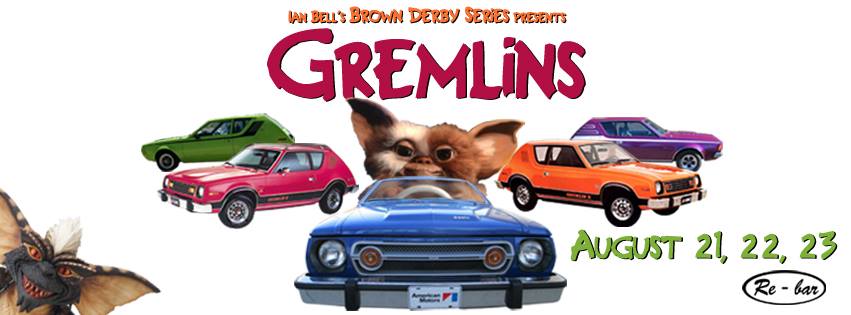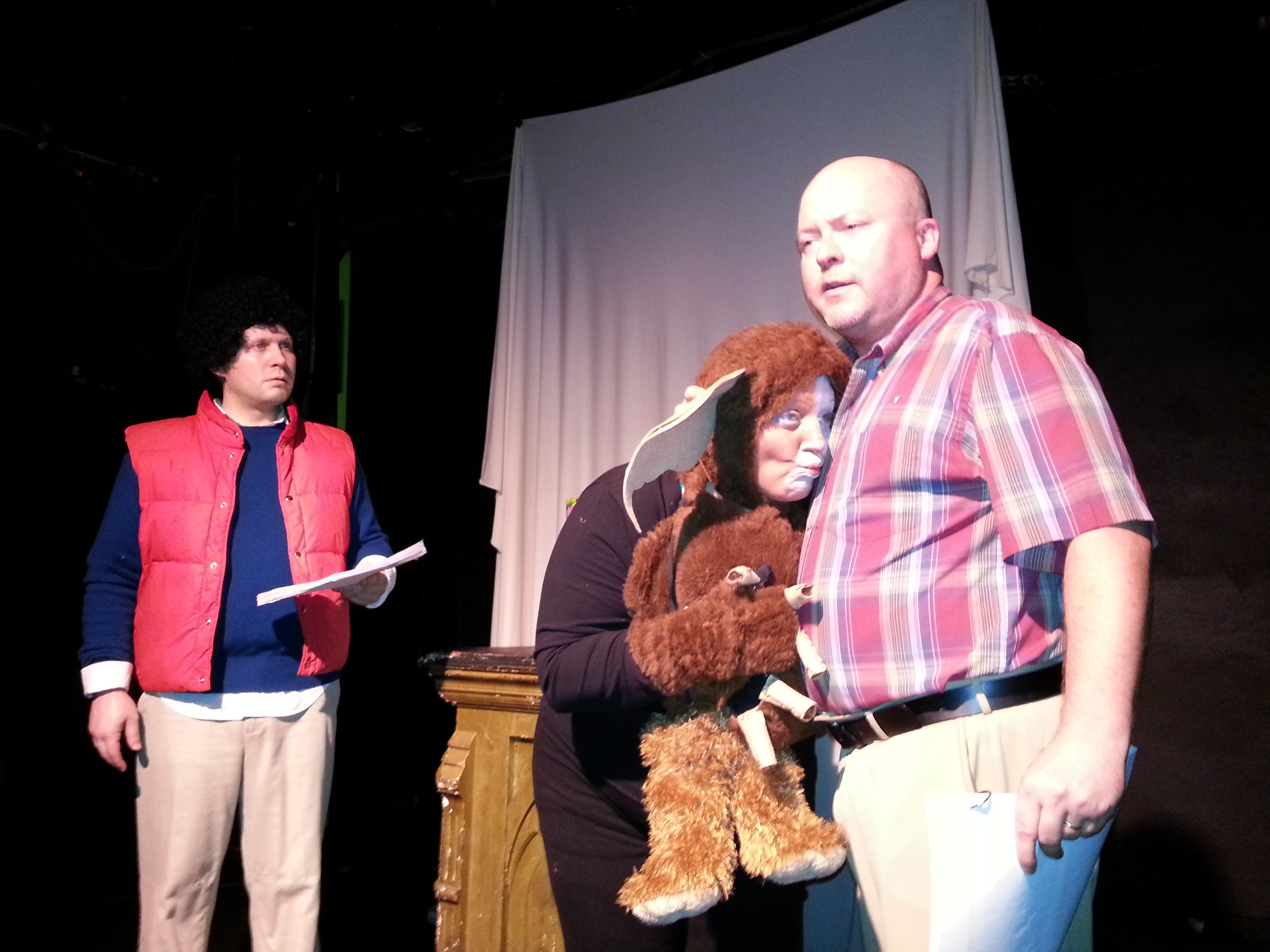There are three great elements to living in Seattle: Art & Theater, Gay Community, and a great Film Community. The best parts of living here is when the three merge to provide White Hot Flashes of Pure Entertainment.
One of the most venerable institutions of Seattle is Ian Bell’s Brown Derby Series, hosted at Re-Bar. This year, the Brown Derby Series is celebrating it’s 15th anniversary this year of ridiculously staging notorious screenplays. To give you an idea of what this series is about, I’ll bring you back to my second, and second favorite, Brown Derby staging (my favorite staging is for another time).
It was February of 2007, and I had been in Seattle all of 5 months. The month prior, I had witnessed the amazingly silly staging of Planet of the Apes, and was back for the next in that year’s Sigh-Fi series. This time around, a ridiculous staging of Paul Verhoeven’s Total Recall. Now, having witnessed the Planet of the Apes, I was wondering how the hell you would stage a $60m science-fiction interplanetary space epic with legions of action scenes on two stages in a bar with a budget of probably $500. Let me tell you, by the time that Sharon Stone came out wielding cardboard legs to kick Arnold Schwarzenegger into submission, I was hooked. In one sight gag, it dissected the essence of the scene, unveiled its truth, pulled a gag on it, commented on its own budgetary limits, and also winked at the audience in a knowing loving manner.
Ian Bell’s Brown Derby Series is at its best when it cuts deeply with love. The gags come fast and furious from the low brow to the high brow and everything in between. Most of the dialogue is borrowed from the original screenplay and tweaked just enough to make it hilarious (a la Airplane), and the gags are fast and furious.
 Tonight (August 20) through Saturday (August 22), Brown Derby is continuing this year’s Teen Horror series with a ridiculous staging of Gremlins, Joe Dante’s beloved Christmas Horror movie for Children. Because I know that we all secretly love Spike, I’ll let you in on who will be portraying him: local punk drag star Jackie Hell.
Tonight (August 20) through Saturday (August 22), Brown Derby is continuing this year’s Teen Horror series with a ridiculous staging of Gremlins, Joe Dante’s beloved Christmas Horror movie for Children. Because I know that we all secretly love Spike, I’ll let you in on who will be portraying him: local punk drag star Jackie Hell.
I interviewed Ian Bell for this week’s profile, and he was goodly enough to send along photos from the dress rehearsal.
Julius Kassendorf: First of all, Happy 15th Anniversary. The Brown Derby Series started in 1999, how did you get started doing these stagings?
Ian Bell: At the time the Brown Derby began, my husband Andrew and I were regulars at the now defunct [Seattle] gay bar Foxxes, which had become a legendary dive for subversive and unique drag performers like Jackie Hell, Ursula Android, Sylvia O’Stayformore, Devestatia and many others. It was sort of a fun game for us to daydream about recasting famous films with these these drag performers – it was like building an alternate universe. At some point, my husband and I were obsessing over the book and movie of Valley Of The Dolls, and I really just wanted to see what would happen if we ventured to that alternate universe where these famous Hollywood stars were replaced by infamous local artists. I called Steve Wells and he gave us a Monday night, and with very minimal rehearsal, props and costumes, we read the entire script (largely unedited and without the jokes written in the way they are now), and I believe it took close to 3 hours…and the audience LOVED it. – or maybe it was just that they couldn’t look away, like witnessing a train wreck. But either, we realized that we had something that was as thrilling – or a terrifying – to watch as it was to be in.
Julius: You started with Carrie, The Poseidon Adventure, Valley of the Dolls and The Stepford Wives in your first season. Why those four?
Ian: They just seemed right. In my mind they all belonged together as a set, partly because aesthetically they come from a certain Hollywood era, partly because they’re all sort of gay-cult-classics, but I began the series that year to primarily highlight the performance talent of the drag queens and these films all have outspoken and iconic female roles that battle for the survival of the individual.
 Julius: Your selections range from the beloved (Gremlins) to the derided (The Stepford Wives) to the cult (Trapped in the Closet) to the populist (Titanic). What are the qualities that you look for when you’re selecting the films? And, why Gremlins?
Julius: Your selections range from the beloved (Gremlins) to the derided (The Stepford Wives) to the cult (Trapped in the Closet) to the populist (Titanic). What are the qualities that you look for when you’re selecting the films? And, why Gremlins?
Ian: Well, an almost cultish fan dedication to the film is important, and just about all of the films I select have that quality. They also need to be a little over the top and take themselves seriously in an almost operatic way, and that kind of seriousness ends itself well to camp and character. Of course they need to have a certain amount of “money shots” that will be fun to try to recreate with cardboard and Silly String. Overall I think one of the most important ingredients is the element of impossibility – whether its trying to do special effects, of famous iconic film shots, or casting a man in an iconic role about what it means to be a woman, or non-singers to sing an entirely sung Hip-Hopera – its not fun unless at some point we are asking ourselves “how the hell are we going to do this on stage with this group of people?”
Julius: Do you have any guiding principles when you’re crafting your stage show?
Ian: If a Brown Derby is too polished, something is wrong. – which is why they are seldom done more than three nights. They should always have a sense of chaos and unpredictability. They should be low-tech, inventive and proud of imperfection.
Julius: You listed Ross Whippo as your co-adapter for Trapped in the Closet, but none of your other press releases have a listed adapter. Are these stagings all from you? Or, what’s your adapting process?
Ian: Ross, being a huge Trapped In The Closet fan, introduced me to it and it blew my mind. He actually had almost all of the first 12 chapters memorized word-for-word and note-for-note so when it came time to rehearse he typed out the entire transcript himself. My part of the adaptation had more to do with incorporating the DVD Commentary and staging the piece so it made sense live. But Trapped is a unique Brown Derby in that we don’t add any jokes of our own, we deliver it without editorial and let the humor come completely from committing to R. Kelly’s vision…and from the fact that we can’t sing that well.
Most Brown Derby go through a couple stages of adaptation but usually there isn’t an official adaptation credit because “it takes a village” to get to the final script that is read on stage. I do the first few edits, which involves reconciling whatever draft of the screenplay I have with the movie (typically, the final draft of the script as it is seen on the screen is not available to the public), then trimming the screenplay, cutting out scenes and character that it can be staged in two hours, keep the action moving, be done by only seven actors and myself, [and make it] lean enough that when we add jokes it won’t be too long on opening night. Once rehearsal starts, the scripts become a mess of arrows, and exes and added jokes and alteration. So at some point, just about everybody has a hand in adapting the script.
Julius: One of the conversations that’s been turning up lately has been that of “What is camp?” Some sides believe that camp is a dissection and should be unintentional (Valley of the Dolls), while others feel that the best camp value is completely intentional (Beyond the Valley of the Dolls). Do you have any personal opinions or insight into the aesthetic of camp and its roots?
Ian: I do indeed have an opinion on it (Uh-oh, this may get a little dry so I’ll put something lighter and less analytical at the end of my answer). In fact one of my pet peeves is when directors, producers or writers don’t know their Camp from their Parody. Strictly speaking Camp is a comedic technique, or a performance genre. It’s an inversion of beauty; a subversive, exaggerated, opposing reaction to an understated “norm” that is often taken as gospel by the rest of society – and if it is done right, after seeing the Camp version, you are unable to look at the “norm” the same way again; the “norm” now looks just as Campy as as the Camp!
Where it gets confusing is that Camp can take itself as seriously as the thing which it is Camping (or that has Camp Value). Camp does not overtly wink at the audience and let it know its kidding – part of its fun is that Camp insists you take it seriously. In the example you bring up of Valley of the Dolls vs Beyond The Valley of the Dolls, they are both complete films unto themselves (and despite their names have almost nothing in common), but Valley of the Dolls is ripe for camp or has Camp Value, while Beyond the Valley of the Dolls is Camp. Valley of the Dolls was not perceived by most audiences as Camp when it was released, nor made to be Camp by performers (possibly, Susan Hayward excepted), yet it became seen as Camp by a cultish, largely gay following who changed all viewers perception of the film thereafter. I am pretty sure that Beyond the Valley of the Dolls was made and perceived as Camp from the get go. So are both Camp or Campy? Yes.
And now something less lighter and less analytical: Poop.
Julius: The Brown Derby Series has always had a steady band of regulars – Imogen Love, Freddy Molitch, Josh Hartvigson, Joe Randazzo, Scott Shoemaker – along with frequent guest stars: Jackie Hell and Adé, to name but two. How did you gather such fine thesbians? Does Seattle spawn them? Is there really something in the water here?
Ian: I’ve always just asked my friends – many have performance experience but not all, but I guess they all share a sensibility which is tough to pin down. Because the Brown Derby is this scary, chaotic performance environment, it is really helpful that we all are comfortable and familiar with each other. In fact, you could argue that it is BECAUSE we are all friends that the Brown Derby is a scary, chaotic performance environment. There is definitely a Brown Derby company – it maybe more accurate to say there have been many Brown Derby companies – but one hasn’t deliberately been created. Our group of talented misfits found each other organically and the group is constantly changing and morphing, expanding and shrinking. Some folks have asked me if they can audition for a Brown Derby, and I have to say that there aren’t conventional auditions, because its not a conventional theatrical process; I just tell them to invite me to their next show, or chat me up next time your having a drink. So, if there is something in the water, I’m guessing its probably booze.
Julius: Sophie’s Choice question: What have been your three favorite stagings over the past 15 years?
Ian: I think Sophie put it best: “I can’t choose! Please! I can’t choose!”
Julius: Why only one weekend and only three nights?
Ian: I’ve tried doing them for four, and even did one two weekends. But it loses something. The actors become too familiar, too confident, and the audience puts off coming until the last night and starts to expect a more polished product. By keeping it “three nights only” the show maintains an frantic energy and the stakes are high for both the actors and the audience. I am thinking of doing a re-mount of Purple Rain next season, and since it will have a lot of the same elements as before, it will be a little different in that respect from the typical Brown Derby (when we remounted Carrie, we threw out the 1999 script and re-adapted the show), so I am thinking it might be ok to maaaaybe do that one for a couple of weekends…we’ll see…
Julius: If you had a question you wished people would ask you, what is it? And, what is your answer?
Ian: Well, that’d be cheating… wouldn’t it? – oh, uh by the way that’s wasn’t the question I’d ask. I mean the answer to your question; I mean the answer question to you question question – I mean your answer and question question…wait….what were we talking about?
Ian Bell’s Brown Derby Series presents Gremlins will be performed Tonight through Saturday at Re-Bar at 8pm (doors at 7). Tickets: $20 at door. No advance sales, no credit cards.

